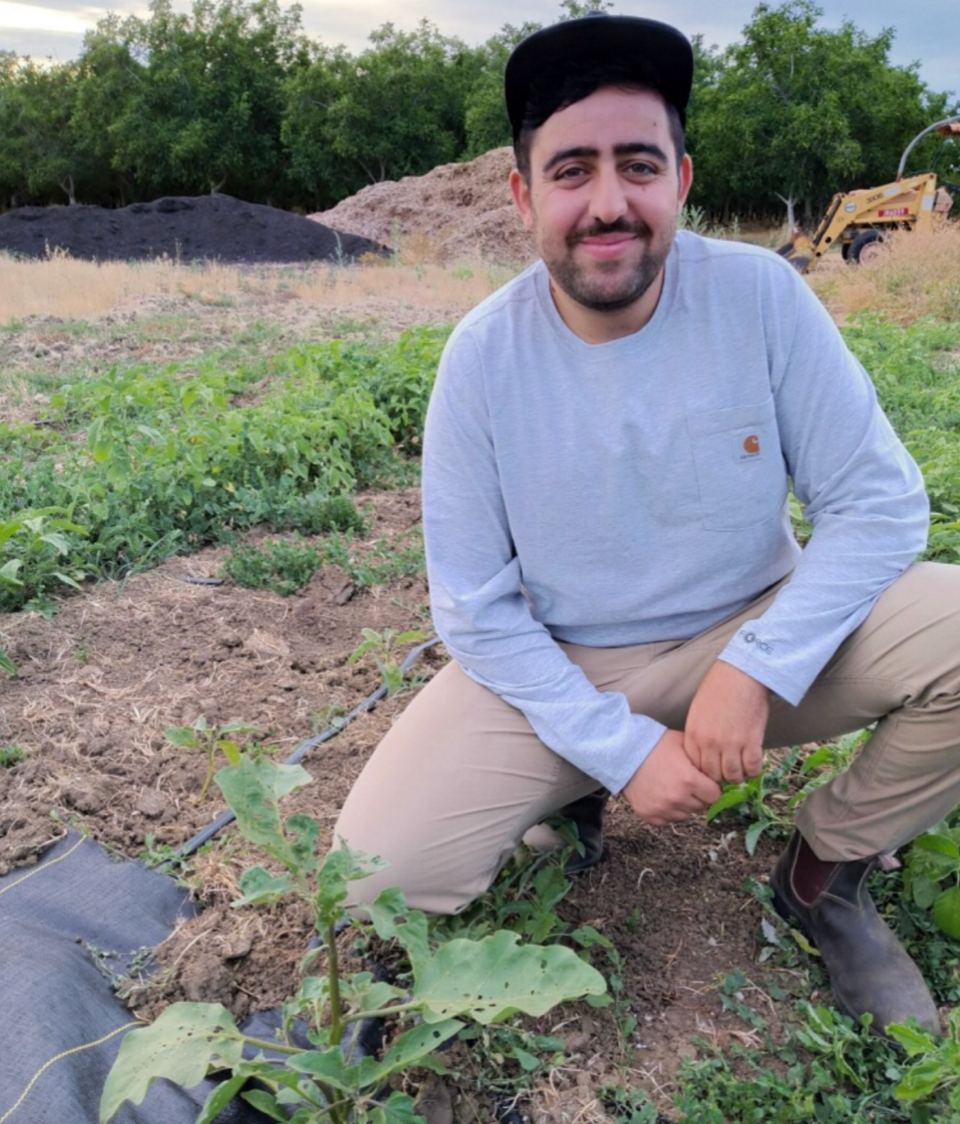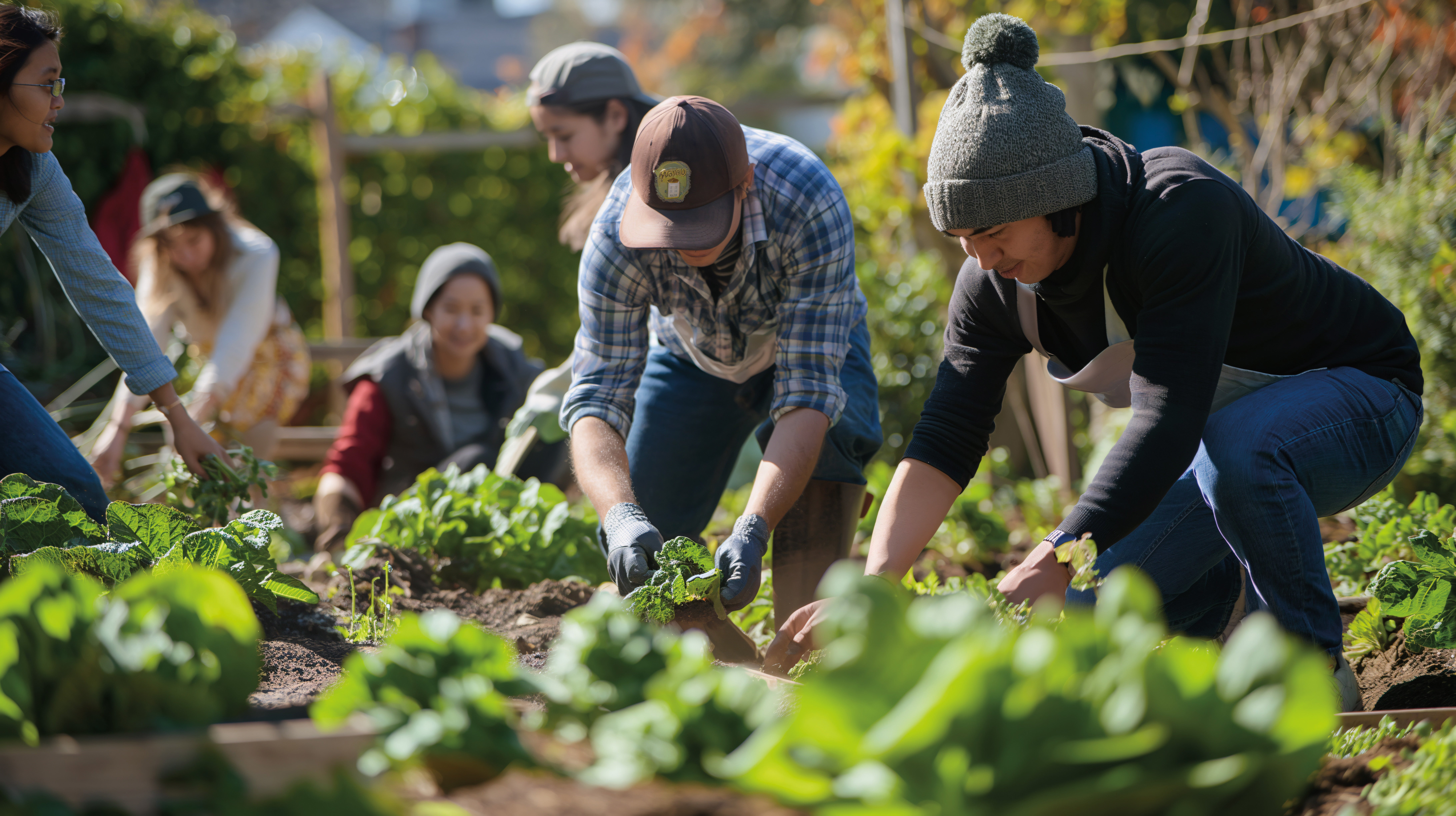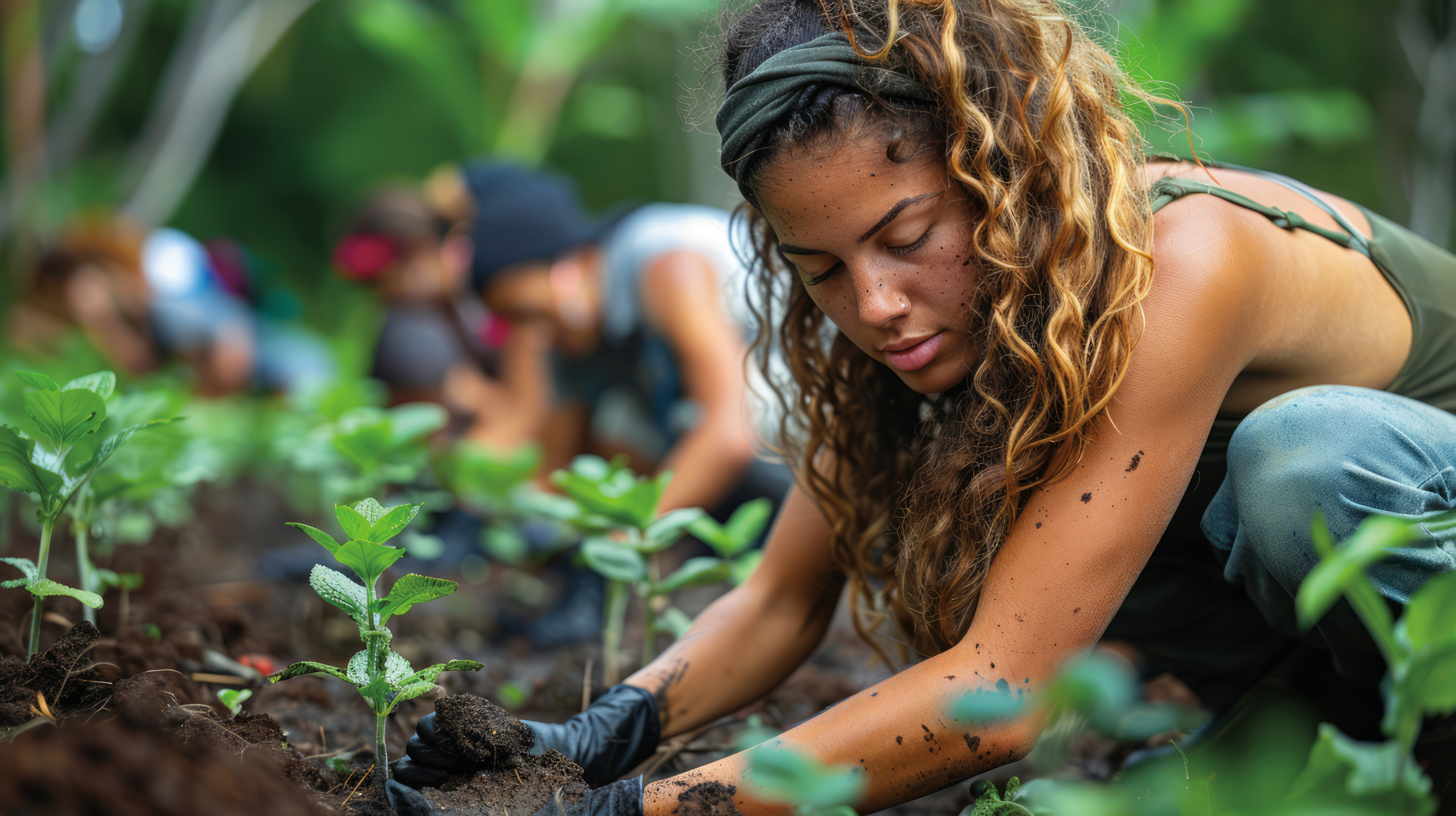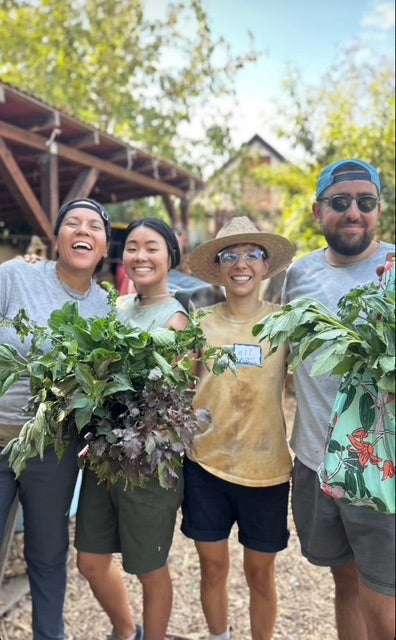A Passion for Community Engaged Environmental Education
By John McDonald
November 12, 2024
Read the magazine view of this article
Chris Jadallah, an assistant professor of environmental justice in education, is working with Black Thumb Farm in the San Fernando Valley to pilot a small research and design project, that is looking at the relationship between gardening the land and our relationship to it.

As a young boy, UCLA’s Chris Jadallah spent a lot of time in his grandparents’ backyards in Northern California. Palestinian immigrants to the United States, his grandparents were “fellahin,” an Arabic term historically referring to peasant agricultural workers or farmers with a deep connection to the land. His grandparents and his ancestors before them had farmed olives in Palestine for generations, and they had transformed their backyards in northern California into lush gardens. It was there that Jadallah spent many an hour playing and working, learning about gardening and plants, and developing a deep interest in and bond with nature, rooted in his Palestinian heritage. It is a bond that drives his work today.
Jadallah built on that passion to become an assistant professor of environmental justice in education at the UCLA School of Education and Information Studies. His research focuses in great part on community-based approaches to science and environmental education, examining the social, cultural, and political dimensions of teaching and learning, with a specific focus on community-based and place-based learning environments. His work takes place across a range of settings—from diversified farming systems to river restoration efforts—as well as projects in urban communities.

“Scientists do amazing work and I am a scientist by training. But I think that we often put too much stake in the idea that science is the answer—that science alone will save us,” Jadallah says. “In my mind, it’s scientists working alongside communities that will likely move us toward better solutions for environmental problems.”
Jadallah believes scientific knowledge, technical skills, and expertise are essential to resolving challenging environmental problems, but he also places great value on the knowledge and ideas of local community members. As an example, he offers a story from his research on a community watershed monitoring project in western Montana near Missoula. There was a fly fisherman with a deep connection to a creek where a dam removal project was taking place. From hours of fishing on the creek, the fisherman had developed a nuanced understanding of how its channel was braided and where fish were most likely to be. He understood how and where the large woody debris, which was an important feature of the creek habitat, was likely to be situated. That fly fisherman had an intimate knowledge and understanding of the creek. He may not have had formal science training, but he made valuable scientific contributions that were very helpful to the project.
Jadallah’s belief in the value of community knowledge and input traces back to his experiences working as an ecologist. He spent several years doing native pollinator research, spending a lot of time doing fieldwork at agricultural sites, literally catching bees all day with a net and recording the plants he was catching them from. He would meet farmworkers and began casually talking with them, explaining as a scientist what he was doing. And they started sharing information back, telling him what they were noticing about the bees, explaining he was coming too late in the day and that if he came earlier, right after sunrise, that’s when the most bees would be out, and he would be able to catch more and understand them better.
“These farm workers knew about the bees,” says Jadallah. “They had a connection to the land and ecology. They knew things that I didn’t know, even though as an ecologist, I would be considered by outside audiences to be the expert.”
Jadallah never forgot that experience, and his work today is rooted in community. Key to his scholarship is a deep belief in the importance of humility and respect for community knowledge and the need for building robust relationships with community partners.

“Environmental problems are often called wicked problems because they are so complex. They’re not just scientific problems, they are social and political problems as well, and there is a real need to remediate historical injustices and bring multiple knowledge sources to bear on addressing their root causes,” Jadallah says.
“What I try to do in my research is to expand the boundaries of political engagement in environmental problem solving, to broaden the knowledge sources from which environmental decisions are made.”
A major focus of Jadallah’s research is developing partnerships with nonprofit organizations or other community-based organizations. Much of his work takes place in the context of community-based projects where youth are working to revitalize, repair, and renew social and ecological relations in the greater Los Angeles area. These include working collaboratively with Indigenous youth and educators at Academia Anawakelmekak, as well as scientists at the Natural History Museum of Los Angeles County, to support curricular projects focused on urban wildlife habitat revitalization with land recently returned to the Gabrielino-Shoshone Nation in Northeast Los Angeles. Jadallah has also been working with the nonprofit organization Clockshop, co-designing curriculum development and conducting program evaluations in support of youth programs that engage young people in using arts and advocacy strategies to explore alternative stories of the Los Angeles River and surrounding neighborhoods.
“These projects demonstrate how the knowledge of different communities who may have been traditionally excluded from environmental decision-making represents an essential asset in designing more healthy, just, and sustainable futures,” Jadallah says.

“If there is a common thread to all my projects, it’s exploring the cultural, social, and political questions in environmental challenges, and working with the larger community in addressing them as such through learning and education.”
One of the projects Jadallah is most excited about is his work with Black Thumb Farm in the San Fernando Valley. The aim of the organization is to grow the connection of young people to the natural world, nourish their passions, and empower them to advocate for a sustainable future for themselves and their communities. The farm engages Black, Indigenous, and other people of color in the development of leadership skills, offering mentorship, and access to healthy, quality produce through hands-on training and experience in farming and gardening. Black Thumb Farm’s programming focuses on educating youth and restoring the vital, broken connections of communities with nutritious food and the land. Food is grown sustainably with an eye on long-term soil health. The farm offers neighborhood workshops and maintains school garden programs at two schools in the San Fernando Valley.
“Black Thumb Farm’s work is focused on garden education, community gardening, and school gardening, but it’s more than that as well,” Jadallah says. “They think deeply about the sociopolitical dimensions of farming and gardening and challenge the idea that gardening is just like this kind of neutral or apolitical practice that people engage in. Gardening holds a lot of deep significance, especially for communities of color who have long histories growing particular crops and engaging in land-based stewardship practices, and from these histories and practices comes deep ecological knowledge.”
Over the next year, Jadallah is planning to work with Black Thumb Farm to pilot a small research and design project. Many of the young people at the farm are youth of color, and while they live in an intensely urban area, they come from families who have different connections to farming and agriculture and who may have knowledge about farming, the land, and relationships to the land. The idea is to explore and surface those relationships and the knowledge that exists.
“It’s just a matter of bringing it out and drawing it out,” Jadallah says. “We are going to work with the kids to explore the possibilities of doing oral history work in their communities where they will learn how to do interviews. They will then conduct their oral histories with their family members and learn about their family’s connections to the land.”
The project is in some ways a natural extension of a research project Jadallah has been doing, interviewing over two dozen garden educators across California. He says that one of the main things that came out in the interviews is that educators said they want to identify ways to engage in garden teaching that is more historically responsive and culturally situated; not just basic plant life cycle and nutrition information, but going deeper in ways that can actually enrich teaching about those things.
“It has made me think about what it would mean to bring a richer view of gardening to education, to more deeply engage histories and futures around our environment, and make school gardening something that is socially and ecologically transformative,” Jadallah says.